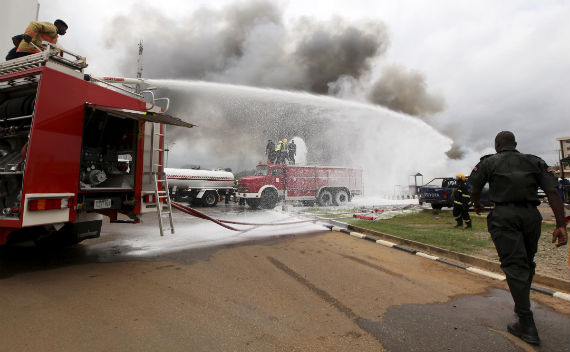Nigeria: Was It a Suicide Attack and Does It Matter?
More on:

On June 16, a vehicle loaded with explosives detonated in the parking lot of Louis Edet House, the Abuja headquarters of the national police. In the aftermath, the police said that the likely intended target was the inspector general of police, Hafiz Ringim, to whose motorcade the vehicle with explosives had attached itself as it entered the compound. The police said that the crime was committed by a suicide bomber. Boko Haram, a shadowy radical Islamic organization that has declared war on the Nigerian state, claimed responsibility. Shortly before it had threatened retaliation against Ringim who said he would liquidate Boko Haram in a public speech in Maiduguri. Boko Haram also claimed that its strength had been augmented by the arrival of ’fighters’ from Somalia.
In the aftermath of the bombing, the Abuja government has arrested certain Islamic religious leaders in the North, holding them without charge under the provisions of the anti-terrorism act.
In an earlier blog post and in an article that I wrote with Asch Harwood appearing on The Atlantic’s website, I accepted that a suicide bomber was responsible for the the attack at Louis Edet House, and that this new tactic marked a significant escalation of Boko Haram’s challenge to the Nigerian state.
However, suicide is a cultural anathema in West Africa and there is no indigenous history of such attacks. On June 22, in an abrupt about face, the police said that attack had not been made by a suicide bomber but rather it was a car bomb perpetrated by a "foreigner."
Was it a suicide attack? Here is an alternative.
On October 1, Nigeria’s fiftieth independence celebration, there was a serious car bomb explosion only several hundred feet from Eagle Square, where most of Nigeria’s most prominent political figures were gathered. At the time, President Jonathan claimed that the attack was perpetrated by criminals from the North. Subsequently, however, the Nigerian government said Henry Okah was responsible for the attack. Okah, an arms dealer associated with the Delta-based Movement for the Emancipation of the Niger Delta (MEND), is at present in jail in South Africa. Nevertheless, October 1 would seem to indicate that MEND has the capacity for a car bomb attack in central Abuja. If the ’suicide attack’ was in fact a car bomb attack, MEND is a suspect. Further, the Delta is in flux. Jonathan has just announced the end of the Delta amnesty program, while MEND has threatened to renew attacks on oil produciton facilities if Abuja does not address the region’s grievances.
Why would the police claim a suicide attack took place if it did not? Claiming a suicide attack might serve as an excuse for what looks like very poor police security at Louis Edet House. Police security for the October 1 event also looks to have been lax. Because of its novelty, a suicide attack also provides a better justification than a car bomb for a security clamp-down in the North.
On balance, while recognizing alternative scenarios, I still think that the evidence is strong that the June 16 attack at Louis Edet House was a suicide attack, though it may have been carried out by a Somali rather than a Nigerian.
Does it matter whether it was a suicide attack or a car bomb? Perhaps not so much. The bottom line is that on June 16 there was a major attack using explosives against a target in central Abuja, highlighting that the capital is no longer immune to terrorist attacks.
More on:
 Online Store
Online Store